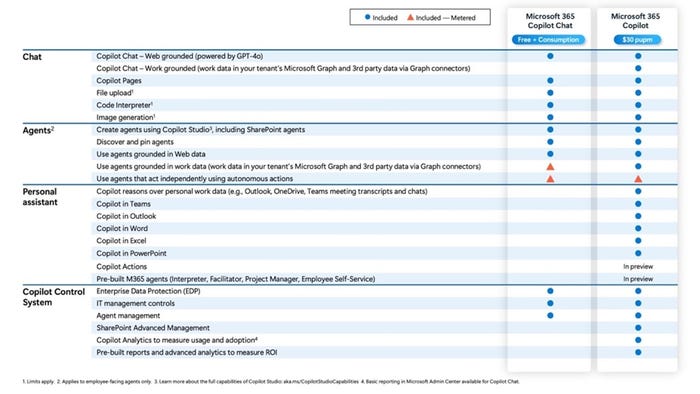Microsoft Intros Copilot Chat; Google Cuts AI Prices for WorkspaceMicrosoft Intros Copilot Chat; Google Cuts AI Prices for Workspace
No Jitter Midroll: Microsoft launches a mostly free Copilot while Google bundles its Gemini capabilities into select Google Workspace plans.
January 16, 2025

Microsoft has introduced a new offering, Microsoft 365 Copilot Chat, which essentially adds a ‘mostly free’ tier below Microsoft 365 Copilot. Coincidentally, Google announced that many of its Gemini-powered AI capabilities will now be included for Google Workspace Business customers and Enterprise customers.
“There’s a bit of a race to the bottom in the generative AI space as vendors, especially those competing with Microsoft, see an opportunity to gain competitive advantage by delivering generative AI tools at no additional cost,” wrote Irwin Lazar, President and Principal Analyst with Metrigy in a research note, citing both Zoom AI Companion and Cisco Webex AI Assistant as products offered without an additional fee.
The New Microsoft 365 Copilot Chat: Mostly Free
Microsoft introduced a new offering that includes AI chat powered by GPT-4o, AI agents, and IT administrative controls. Note that Copilot Chat is different from Microsoft 365 Copilot, as the following graphic illustrates. The practical difference for the end user is that they can query Copilot Chat, but they can’t take advantage of workplace data repositories or provide personalized meeting recaps and other assistive features within M365 apps without paying.
With Microsoft 365 Copilot, the AI assistance is integrated with Microsoft’s productivity applications, but it costs $30/user/month. By comparison, Copilot Chat is free, but AI agent usage is only available via metered usage.
For both Copilot Chat and Microsoft 365 Copilot, Microsoft differentiates between using agents that are grounded in ‘web data’ and ‘work data,’ and agents that ‘act autonomously with autonomous actions’ – more on these distinctions below.

Source: Microsoft
Copilot Chat
Copilot Chat provides the now-typical ‘AI assistant’ capabilities via a chat interface and supports file uploads into that chat interface – which enables Copilot to analyze data in Excel, summarize a Word document, etc. This chat-based feature also supports image generation and real-time collaboration on shared content with people and AI.
The completely free version of Copilot Chat is only grounded in Web data, powered by GPT-4o, but Copilot Chat can also support metered, ‘agent-based’ access to enterprise data. Microsoft 365 Copilot supports grounding in an enterprise’s Microsoft Graph and third-party data via Graph connectors – i.e., the organization’s internal data, knowledge, etc. The latter option potentially makes generated responses more relevant to the organization (because the model ostensibly ‘knows’ more that is relevant to the prompt).
“Even with today’s announcement, Microsoft has the least capable free AI assistant, and the most confusing AI licensing, given that even with the new free Copilot Chat, certain agent capabilities incur consumption costs based on usage,” wrote Kevin Kieller, Co-Founder and Lead Analyst, EnableUC Inc., in an email to No Jitter. “Microsoft recently stated that in their current fiscal year they will invest $80 billion in AI infrastructure. Given this, Microsoft is aggressively experimenting with per user add-on licensing (e.g., Microsoft 365 Copilot, Teams Premium, SharePoint Premium, etc.) and consumption billing (e.g., 2 cents per agent generative answer, 30 cents per agent invocation that accesses the Microsoft Graph) in a bid to generate a return on this and previous investments in OpenAI. While the new Copilot Chat is initially free, certainly Microsoft is hoping it is a path to revenue generating upsells.”
Copilot Agents & Pricing
Microsoft 365 Copilot Chat also supports the creation of AI agents via natural language. Accessible via the Copilot Chat interface, these AI agents can automate repetitive tasks and business processes.
However, usage of these agents is governed by metered pricing – each ‘answer’ from an agent is assigned to one of five groups: Web grounded answers, classic answers, generative answers, Tenant graph grounding for messages, and Autonomous actions.
“Classic answers are ‘canned’ responses. The response needs to be exactly defined when an agent is set up. This is useful to avoid hallucinations since all responses are known ahead of time,” wrote Kieller. “Generative answers use the large language model (LLM) to craft an answer. Generative answers can feel more natural but also may increase the chance of incorrect responses.”
Each category of answer consumes a certain number of ‘messages.’ For example, Web grounded answers consume 0 messages while Tenant Graph grounding consumes 30 messages, and Autonomous (agent) actions consume 25 messages. Messages are purchased via the Copilot Studio meter in Microsoft Azure, a pay-as-you-go option, for $0.01/message, or via pre-paid message packs priced at $200 for 25,000 messages/month. (That link also provides examples of how pricing is calculated by type of answer.)
“Effectively, agents that provide classic responses cost 1 cent per invocation and agents that access the LLM to create a response cost 2 cents per invocation. If an agent accesses the Microsoft Graph, which includes accessing any files stored in SharePoint, the cost is 30 cents per invocation,” Kieller wrote. “Whether this provides value that exceeds the costs will be entirely dependent on the use case the agent is solving. I expect lots of experimentation in 2025, some disappointment, and some successes.”
Autonomous agents, per Microsoft’s definition, “understand your work, act on your behalf, and can automate complex business processes,” and were introduced in a public preview in November 2024. To enable these autonomous agents, Microsoft introduced the concept of “autonomous actions, [which] are generatively orchestrated triggers, topics, data connectors, and workflows and are visible in the activity map displayed in generative orchestration mode.”
These capabilities have been in public preview since November 2024; on February 1, 2025, they will be available in a paid preview program.
Copilot Control System
Copilot Chat includes capabilities of the Copilot Control System, including enterprise data protection (EDP) for data privacy and security and the ability to govern access and manage the usage and lifecycle of Copilot and agents, as well as measurement and reporting. This video shows how agents used in Copilot Chat can be managed.
“With this Copilot Chat announcement, Microsoft appears to be taking steps to reduce the startup cost of AI—though Copilot Chat is limited in functionality,” wrote Irwin Lazar, President and Principal Analyst with Metrigy in a research note. “However, the ability to use Copilot Chat to create agents and only pay on a usage-based basis could allow customers to experiment with agents to determine their potential benefit, at minimal cost.”
Google AI: Now included in Workspace Business and Enterprise plans
Google announced that many of its Gemini-powered AI capabilities will now be included for Workspace Business customers today and to Enterprise customers. Previously, these features cost an additional $20/user/month. Effective immediately, Google said that it has simplified plans and pricing for Google AI.
A customer using the Workspace Business Standard plan with a Gemini Business add-on previously paid $32 per user, per month. Now, that same customer will pay $14 per user, per month —$2 more than they were paying for Workspace without Gemini.
More specifically, Gemini-powered AI assistance will now be in Gmail, Docs, Sheets, Meet, Chat, and Vids. Capabilities include summarization, drafting, search, note taking, and more. Users will also be able to chat with Gemini Advanced, Google’s ‘next-gen AI,’ for assistance in coding, research, and data analysis and lets users build Gems, which are custom-built ‘AI experts’ that can help with repeatable or specialized tasks. Additionally, NotebookLM Plus will also be available to users; it is billed as an ‘AI research assistant,’ and is a key part of Google Agentspace.
According to Lazar, “Google’s Gemini for Workspace announcement helps its competitive positioning by delivering functionality like Copilot at no additional cost, providing a significant advantage when comparing the baseline $14 a month fee for Business plans versus the more than $40 a month cost of a Microsoft 365 + Copilot license.”
Moving forward, Lazar recommended that enterprises evaluate Copilot Chat as a way “to drive development and adoption of agentic AI and to provide an alternative that will mitigate the risk of employees using non-company managed services like ChatGPT and Grok. Google customers should rapidly develop training and governance plans to successfully take advantage of Gemini for Workplace. Existing Microsoft customers may also want to look at the potential to reduce IT costs by leveraging the Google suite as an alternative to Microsoft 365.”





